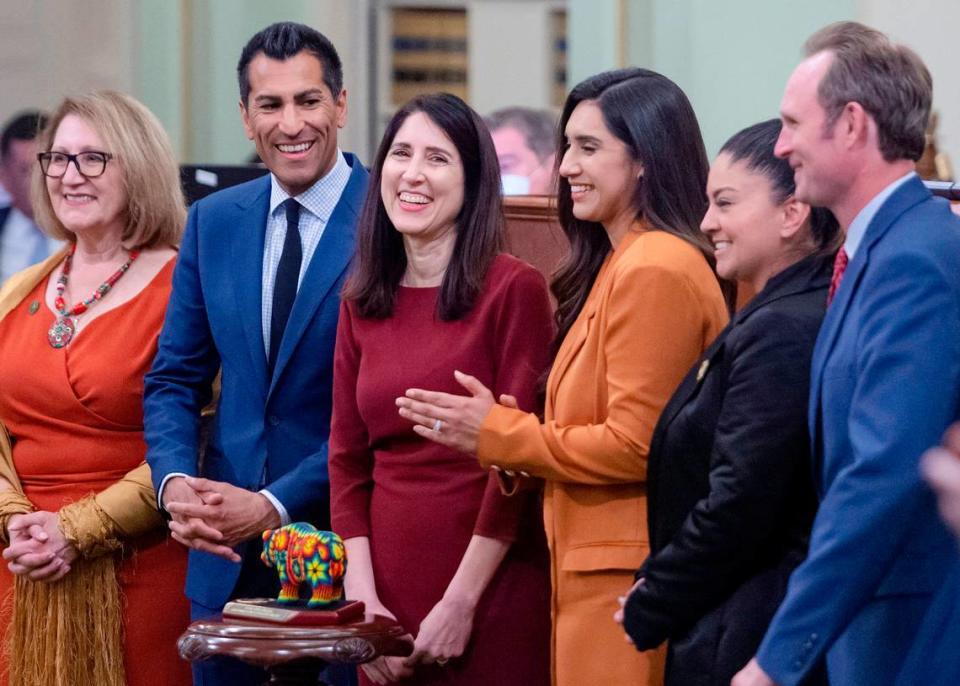California’s Latino lawmakers prioritize bills each year. How many have passed in the last decade?
- Oops!Something went wrong.Please try again later.
In a significant shift from anti-immigrant policies of the 1990s, California now leads the nation in helping undocumented residents — issuing driver’s licenses, protections from deportation, COVID-19 pandemic relief, health care and, most recently, food assistance.
These wins coincide with the Latino community exploding to 40% of the state population, and speaks to the growing influence of the lawmakers representing them over the last 10 years.
In that time, the California Latino Legislative Caucus — a group that only welcomes Democrats — has championed policies at a more successful rate than the Legislature average and reshaped how the state treats its undocumented immigrants.
An analysis of the group’s priority legislation — an annual set of bills members vote to support — shows that the caucus turns its bills into laws 54% of the time.
Members have pushed forward groundbreaking policies to expand health care access for all undocumented immigrants, create an ethnic studies requirement to graduate high school and provide farmworkers with first-in-the-nation overtime provisions. Other successful legislation has reached beyond the Latino community, including increasing sick days for all California workers and tackling climate policy.
But these high-profile wins haven’t been easy nor without criticism.
They’ve often required multi–year efforts, fueled by Latino leaders who came of age during an anti-immigrant policy effort in the 1990s. These leaders played a long-game in advancing progressive Democratic policies during former Gov. Jerry Brown’s administration that Gov. Gavin Newsom later signed into law.
“We are leading the nation, and it’s because of the Latino Legislative Caucus that we are where we are at,” said Angelica Salas, executive director for the Los Angeles-based Coalition For Humane Immigrant Rights. “No other state can say that.”
While the caucus has occasionally fallen short of its goals, its work since 2014 reveals a largely successful campaign of passing legislation focused on immigrant rights, economic mobility and access to education. From 2014 to 2023, the caucus introduced 136 priorities. Of those, 74 were enacted and another 17 reached the governor’s desk but were vetoed.
That is a higher rate of lawmaking when compared to the annual numbers of the entire Legislature.
Out of the roughly 2,300 bills put forth each year, about 35% to 40% become law, according to Chris Micheli, an adjunct professor at the McGeorge School of Law at University of the Pacific and longtime Sacramento lobbyist.
The caucus’ rate of implementing legislation was not surprising to Micheli and Fernando Guerra, a political science professor at Loyola Marymount University.
Both experts said it reflects the group’s rising clout in Sacramento. The caucus was half its size just 15 years ago.
The group, now at a record 35 members, makes up nearly 30% of the Legislature and an increasing number of the leadership roles. The first Latino Assembly speaker in California history was chosen in 1996. Six Latino speakers have followed since then.
“There’s always representation to push these types of bills and the eventual success,” Guerra said.
‘Defined by those moments’
Former Assemblywoman Cristina Garcia, who joined the Legislature and caucus in 2012, recalls a time when California wasn’t so welcoming to its undocumented residents.
In 1994, voters overwhelmingly approved Proposition 187, a ballot initiative to deny public benefits to undocumented residents. Legal challenges prevented the law from taking effect, but it nonetheless inspired young Latinos, like Garcia, to get involved in politics.
Garcia protested against Prop. 187 as a high school senior. She participated in a school walkout on Interstate 5, which runs through Los Angeles, with her undocumented father in mind.
“A lot of us are defined by those moments,” said Garcia, referencing the number of Latino lawmakers who have since joined the Legislature.
Those moments came full circle in the 2010s.
Two years after Garcia joined the Legislature, the caucus secured its biggest breakthrough in years — winning approval of a measure that allowed undocumented immigrants to receive driver’s licenses. The win set the stage for the progressive policies that came in the next few years.
“That victory of driver’s license was a reminder to us of our power and our need to be ambitious and to keep pushing more policy forward in the space,” Garcia said.
In 2014, the caucus prioritized legislation to create a ballot measure to repeal another anti-immigrant policy from the 1990s — a proposition which required English-learners be taught in English-only classrooms. At the time, people erroneously argued bilingual programs lessened adequate learning of English and triggered anger in some immigrant communities.
The caucus priority was enacted into law and led to voters overwhelmingly approving an initiative that repealed the English-only requirement. The initiative has led to immediate growth in the number of bilingual programs, with the state committed to enrolling half of all K-12 students in “programs leading to proficiency in two or more languages” by 2030.
That same year, the caucus secured another major win that would have been unthinkable decades prior.
Then-Gov. Brown signed the priority bill to allow low-income undocumented children to receive health insurance through Medi-Cal. These efforts continued for nearly the next decade, culminating earlier this year after California became the first state to extend Medi-Cal access to all age groups.
The health care expansion qualifies about 1.4 million undocumented Californians for full Medi-Cal coverage. It also contributes to what advocates say is the strongest social safety net for undocumented immigrants in the country.
“We’re creating opportunities, and these have been big wins for all of our communities,” said Assemblywoman Sabrina Cervantes, D-Riverside and caucus chair.
‘Not giving up’
Through its work in the last 10 years, the caucus has persevered. In some years, the group’s priority legislation would fail and need to be retried in the next months and sometimes years.
Former Assemblywoman Lorena Gonzalez, who joined the Legislature and caucus in 2013, recalled her farmworker bill to expand overtime pay for farmworkers. Gonzalez said lawmakers had tried to advance similar legislation for decades, but each time it failed.
In the summer of 2016, the bill died once again. This time, just three votes short of the majority needed to pass.
But two weeks later, Gonzalez revived the legislation and later amended the bill to allow smaller farms more time to implement the change. The legislation narrowly passed the Legislature, with the help of nearly every single member of the caucus.
Former Assemblyman Jose Medina’s bill requiring California high school students to take ethnic studies to graduate had its own struggles.
Medina first introduced the bill in 2018, only to face lengthy, controversial fight for the curriculum that would draw attention to groups whose history and stories have been traditionally overlooked.
For three straight years, the legislation was either delayed or vetoed by Brown and Newsom for reasons ranging from a fear of “overburdening” students to saying the curriculum was “insufficiently balanced.”
But Medina, a former ethnic studies teacher, continued to try, emphasizing the importance of students understanding the struggles and contributions of marginalized groups.
The yearslong battle ended in 2021, with Newsom providing his signature and pointing to “a number of safeguards to ensure that courses will be free from bias or bigotry and appropriate for all students.”
Medina recalled the effort, saying it was emblematic of the Latino caucus, and the more than 16 million Latinos its members hope to represent in California.
“Not giving up is certainly something that speaks to our community,” Medina said. “That we don’t give up and that we know that some things take a lot of work.”


